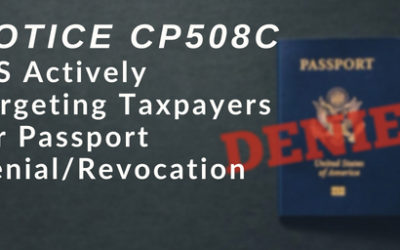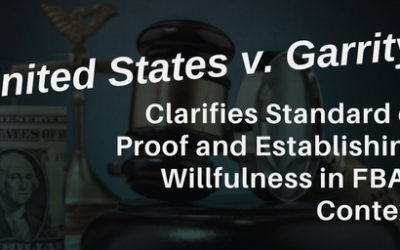The Difference Between Fraud and Negligence in Income Tax Cases
The Internal Revenue Service estimates that only a minuscule percentage of tax crime convictions occur each year. However, the federal agency also estimates that roughly 17 percent of taxpayers violate tax laws in some way. Numbers also tell us at more than three-quarters of income tax fraud is committed by individuals and not corporations. […]
IRS Actively Targeting Taxpayers for Passport Denial/Revocation – Notice CP508C
The IRS is now actively in the process of issuing Notices CP508C to hundreds of thousands of U.S. taxpayers—placing all notified taxpayers’ passports in serious jeopardy. Several news outlets this week report that the U.S. State Department confirms that it has already acted on its part in the process and denied passports to an undisclosed […]
A Guide to International Tax Planning
While operating in multiple jurisdictions, the company must obey all the laws including tax laws of those countries. This means if the company operates in more than one country, it must pay the appropriate taxes from these countries. For companies, the tax issue is a financial headache and can be real legal and international tax […]
United States v. Garrity: Clarifies Standard of Proof and Establishing Willfulness in FBAR Context
On April 3, 2018, in United States v. Garrity, the U.S. District Court for the District of Connecticut considered the Government’s suit to reduce to judgment a willful Report of Foreign Bank and Financial Accounts (FBAR) penalty and determined that: (1) the burden of proof is preponderance of evidence, and (2) proof of reckless conduct […]
I.R.C. §280E: A Buzzkill For Those Who Keep Poor Records
The recent Tax Court’s Alterman v. Commissioner[1] decision is a lesson in Accounting 101 for Cannabisseurs. Well, technically it’s a valuable lesson about record-keeping to all taxpayers who are subject to Internal Revenue Code (I.R.C.) §280E-but with the currently high audit rates for the marijuana industry, it’s particularly significant for taxpayers currently in that business. Before learning […]
Virtual and Economic Contacts Establish Nexus for Sales Tax
On June 21, 2018, the Supreme Court delivered its highly anticipated decision in South Dakota v. Wayfair, Inc., et al.[1] The 5-4 decision discards the antiquated “physical presence rule” – a rule which has allowed retailers lacking a physical presence in a state to avoid any obligation to collect and remit sales taxes. Significantly, the Court overruled […]






